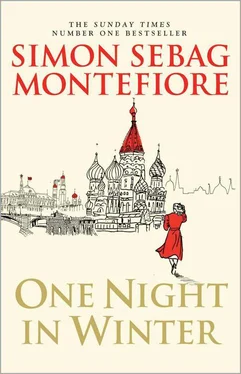‘Even we didn’t know everything. We only saw what Stalin wanted us to see.’
‘So you know she was arrested for lack of vigilance with state secrets and abetting an Enemy of the People. She was named again in the Doctors’ Plot for planning to murder some of the leaders medically and if Stalin hadn’t died…’
‘She’d have been shot.’
‘Yes. She thought she’d had a lucky escape. But could it have been something to do with my father?’
‘Possibly. Stalin arrested the wives of Molotov, Kalinin and Poskrebyshev.’
‘Well, my father’s been dead for twenty years now, and I sometimes wonder whether her arrest could have been connected to the Children’s Case.’
‘Also possible. She helped Benya Golden get the job at the school. Did you know they were at university together in Odessa?’
Senka tilted his head, and Satinov was struck once again by his likeness to Dashka.
‘And then there’s this,’ Senka said. ‘Something’s always bothered me. Could it have been anything to do with me?’
Satinov thought for a while. ‘Tell me,’ he said at last. ‘Did your mother ever talk about her patients at home?’
‘No. Sometimes she whispered to my father and I heard a couple of names.’
‘Such as?’
‘Well, there was Zhdanov, but everyone knew about his heart disease.’
Satinov nodded. ‘You always knew quite a lot for a youngster, but then you were the Little Professor.’
Senka’s answering smile was the very image of his mother’s. ‘Why do you ask if my mother talked about her patients?’
‘Just curiosity. She was so discreet.’ Satinov offered him a cigarette and took one himself. ‘It must have been quite an experience being arrested during the Children’s Case?’
‘Your Mariko was even younger.’
‘True, but she was only there for a short time. You spent much longer in Lubianka.’
‘It was frightening but I concentrated very hard, even though I was so young, on not getting my parents into trouble.’
‘You know we executed Komarov and Likhachev with Abakumov in 1954?’
A look of distaste crossed Senka’s sensitive face. What does one expect from a liberal intellectual? thought Satinov.
‘They were thugs,’ he said. ‘After Stalin’s death, I read your interrogations in the KGB files. I have to say: they set you a terrible trap.’
‘They wanted me to incriminate my parents.’
Satinov shook his head. ‘Our Organs were full of criminal elements in Stalin’s time.’
Senka looked anxious. ‘At the time, I thought my solution had worked. But when they arrested my mother, I wasn’t so sure. I long to know if I was to blame for what happened to her next.’
Satinov got up and went to his huge chrome safe. He opened it, brought out a heap of papers, and leafed through them. ‘I was looking at these the other day. And here it is, how clever you were. You see here? After your testimony: “Accusations not to be pursued.”’ He paused. ‘I was there when you came out. Do you remember?’
‘I do, very clearly.’
‘When you saw your mother sitting there in the waiting room, you were so excited. We could hear you talking about her; you were so proud of her!’
Senka threw his head back just like Dashka. ‘That’s right!’
Satinov clicked his fingers. ‘But then you said something else. I can almost hear it. What was it?’
‘Well, I said Mama was the best doctor in Russia.’
‘What else?’
‘That all the top people saw her!’
‘Ah – that was it,’ said Satinov, thinking back to his days in exile when he had almost wished Dashka ill for making him love her so much. There had been times too when he wondered if he personally had brought about her downfall. Now finally, Senka had solved things.
What Senka had not known was that just before the Victory Parade in June 1945, Poskrebyshev, Stalin’s secretary, had made an appointment to see his mother. He had told her that he himself was not ill. Instead, he had driven her to a dacha where she had examined Stalin, diagnosed arteriosclerosis and a small heart attack, and advised at least three months’ rest. Aware that his frailty was the only obstacle to his supremacy, Stalin had never consulted her again. His doctors were the only people on earth who had any power over him, their diagnoses the only threat to his power.
Now Satinov realized that Senka, who had so effectively protected his mama, had announced to a room full of Chekists: ‘Oh yes, she’s the best doctor in the world. She sees all the top people.’ Reported somehow by word of mouth, this had reached Stalin. All the top people! All? Stalin would wonder: Had she spoken about her top patient? This was more than enough to destroy her. Hence the charge: ‘Mishandling state secrets’.
Satinov sighed; his arthritis was painful. He had been the only person Dashka had told. She hadn’t mishandled state secrets at all.
‘It couldn’t have been that, could it?’ asked Senka, anxious again.
‘Not at all. You managed to get out of there without saying a single thing wrong.’
Senka relaxed visibly and his dark eyes glinted. ‘What a relief,’ he said. ‘Thank you. Now I really should be going.’
Satinov stood up and offered his hand. ‘Did your mother say anything for me? About the package?’
Senka looked into Satinov’s grey eyes for a long moment. ‘No. Nothing.’
Satinov understood then that Senka knew about his love for his mother – and he was glad. Their story lived on.
Wearing a blue cap, Andrei was driving a beige Lada up the drive towards an ugly government dacha, a wooden shooting lodge that looked like an oversized Swiss chalet. Four ZiL limousines were parked there as stately as royal barges. Two bodyguards, specimens of Homo Sovieticus, wearing overtight suits, fat brown ties and combover hairdos, came down the steps with the macho insouciance of KGB men on duty. Andrei showed them their identity cards for the fourth time that hour, and the guards barked into walkie-talkies, returned their IDs and gestured towards Serafima.
Andrei came round to open Serafima’s door. He watched her walk up the steps into the chalet. At the top of the steps, she looked back at him and smiled and raised her hand in a slight wave. Then she went inside.
He sat listlessly for a few minutes. Fate had brought him Serafima, and now his marriage hung in the balance. Nikolasha and Rosa had died for the romantic delusion: totalitarian love as reckless melodrama and desperate possession, an orchestra of trumpets and thunderbolts. Now he saw clearly that the real poetry of love was a meandering river, an accumulation of accidents, the momentum of details.
He reached on to the floor of the back seat and grabbed a wad of essays. Holding them against the steering wheel, he started to mark them with a red pen. Just after Stalin’s death, Director Medvedeva had hired him to teach Pushkin at School 801 where he was loved by generations of pupils for the flamboyant way he brought Onegin to life.
Yes, thought Andrei Kurbsky, he and Serafima owed so much to the clandestine generosity of decent people who had the courage to spread the warmth of kindness even in the age of ice. But they owed most to Benya Golden, and not just a love of poetry. They had named their son Benya, and their daughter Adele, after Pushkin’s verse that Benya had recited to Serafima. And Andrei always started his classes with Benya’s words: ‘Dear friends, beloved romantics, wistful dreamers…’
Serafima was escorted through the shooting lodge, into the gardens and to the edge of the birch woods. Dapper and slim, Frank Belman waited for her in a camel-hair coat, a spotted Hermès tie, yellow slacks and a pair of Gucci loafers. He turned and came towards her, stopping a step away. She did not know what she expected him to do – but he offered her his hand formally.
Читать дальше












